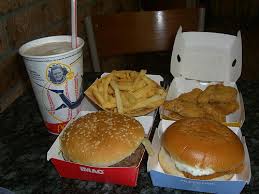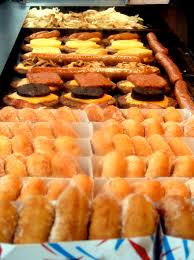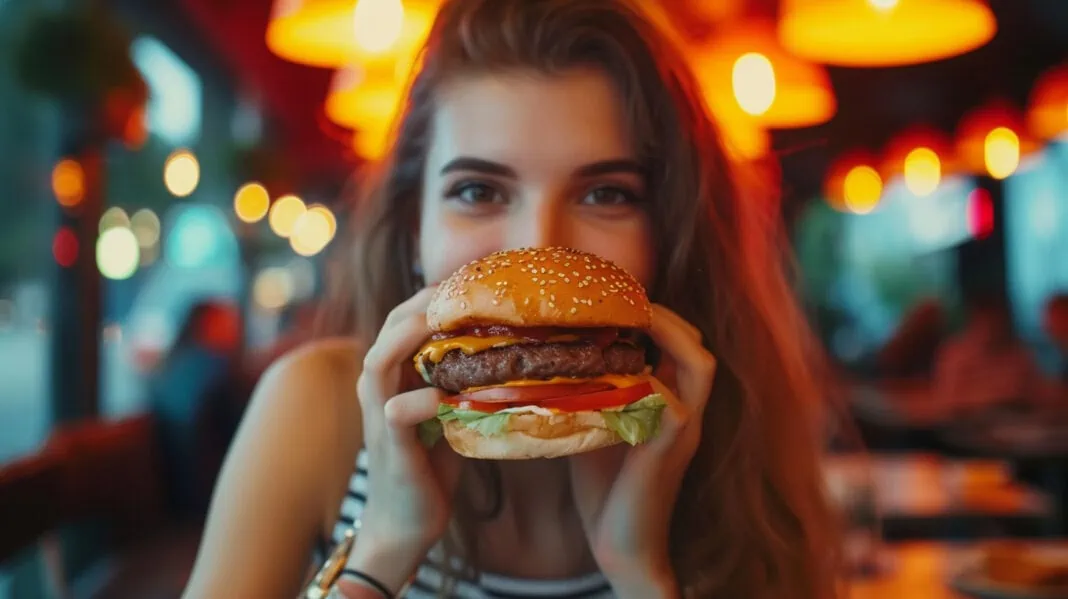Very few diets actually hold enough merit to be considered solid weight loss plans; some of them just make me roll my eyes with their inevitability to cause a yo-yo effect on any poor soul that decides to put their time and money into them, others just make me roll my eyes. Once in a while – although admittedly not very often – one comes around that flat out makes me laugh. Last week, as I was doing some research on the Renegade Diet for the site, I managed to stumble across an ‘eating plan’ (and I use that term very loosely in this instance) that falls into the latter category – It’s called Carb Backloading, and we have Mr. John Kiefer to thank for bringing its popularity about.
Don’t get me wrong, the concept is there. With a few minor tweaks I firmly believe that this has the potential to turn into a pretty solid eating plan. That said, those few minor tweaks would completely change what I can only refer to as the ‘fun part’ of the eating plan, which I guess would defeat the entire purpose. Anyway, I digress – Read on to learn more about what carb backloading is and how it works exactly (at least according to the man that made it popular), and come to your own conclusions – You might decide that it’s the best thing for you.
How It Works
When you subscribe to a carb backloading plan, you basically end up eating little to no carbs (less than 30 grams) during the day (although you won’t have to starve either – proteins and veggies are always an option). Ideally, around 5pm, you’ll do your workout (and ideally, it’ll include some sort of weight training). Once your workout is complete and your muscles are ready to be replenished, the real fun happens:

All of your carbs will be eaten at night (the one exception being if you work out in the morning, in which case you’ll get to eat a small amount of carbs right after your workout). This all sounds pretty similar to the Renegade Diet, doesn’t it? But here’s where it differs – While the Renegade Diet suggests that you stick to healthy carbohydrates such as rice and pasta, the carb backloading theory suggests – and even recommends – that you get your carbs from things like French fries, chocolate cake, and pastries.
While that sounds all well and good – I mean who wouldn’t want to eat those things on a daily basis – and you might in fact lose weight while eating this way (we’ll talk more about why in just a second), I just can’t buy that it’s any sort of good for you. In my personal opinion, your body just won’t be able to function at its optimum level if you’re fueling it with all sorts of processed crap on a day to day basis.
This type of eating plan takes advantage of your body’s natural fluctuations in insulin sensitivity to help build muscle and banish fat cells, while also helping you benefit from the exercise induced increase in insulin sensitivity that you experience after working out. Early in the day, your body is more likely to store carbs that you eat as fat whereas post-workout, it’s more likely to store them as muscle glycogen (energy) – When you work out (weightlift, primarily), you help deplete your body’s muscle glycogen storage; your insulin sensitivity is increased in your muscle cells as opposed to your fat cells. You replenish yourself by gorging on sweet and salty carbs and they’ll go to all the right places.
Getting Prepared
There’s a suggested (although from what I can tell through my research, most often ignored) preparations phase on this eating plan that suggests you go on a ULC (Ultra Low Carb) diet for ten days in order to prepare your body for the schedule change. If you’re someone who knows your body incredibly well and is good with calculations (like many people on weightlifting forums as well as extreme dieters), you might be able to get away with skipping this step.
For the average person, though, this step can prove to be essential as it helps you figure out approximately how many grams of carbs your body can ideally handle. Here’s the math:
You weight yourself before you begin the ten days and again when it’s over. For each pound you lose during the ten days, allot yourself 100g of carbs. So if you lose 4lbs, you could have 400g.
After reading through a few firsthand experiences on various fitness forums, I’d recommend cutting that number in half and then working your way up to it if your body will allow – A lot of people claimed that sticking to the higher number didn’t give them much at all in the way of results, but anywhere from halt to three-quarters seemed to be the money-shot.

A Typical Day On The Plan
Like with any other diet or eating plan, carb backloading can be tailored to your unique individual needs and tastes. That said, here’s an example of what you could be consuming on any given day if you were to choose to adhere to this particular plan:
Breakfast
Breakfast foods will contain mainly proteins and veggies, with maybe a little bit of dairy if you’re not vegan or lactose intolerant. These are some of the things you’ll want to be reaching for in the mornings:
- Bell Peppers
- Spinach
- Eggs
- Steak
- Avocado (and other good fats)
- Cheese
- Mushrooms
Lunch
If you skip breakfast altogether (some people just can’t stomach it), you’ll want to make this a bigger meal. Otherwise, keep it small and simple – Your feast will be coming up shortly anyway! Think of things like:
- Chicken or fish
- Eggs
- Broccoli
- Carrots
- Garden salad
- Olive Oil
Optional Snacks
If you’re someone that’s incredibly active over the course of a day or if you’re someone that just feels the need to mindlessly munch on small snacks throughout the day, you totally can! Just make sure that you’re reaching for things such as:
- Nuts
- Seeds
- Celery
- Carrots
- Avocado (if it wasn’t a part of breakfast or lunch)
- Cottage cheese
- Eggs
Dinner
Ideally, you’ll do your weight training sometime between lunch and dinner. Then the real fun happens! You’re basically encouraged to eat whatever you want now until you reach your magic carb intake for the day. This can include things like:
- Pizza
- Donuts
- Turnovers
- Pasta
- Sugary cereal
- Jelly Beans
- Ju-Jubes
- Rice
- Burgers
- French fries
- Poutine
And other foods that have a high number on the glycemic index.
This is where the plan begins to lose me. Sure, you might be able to eat all of those things and still lose weight (especially if you’re eating less overall than you were before you started the diet), but that doesn’t mean that it’s good for you by any means. Now, if you were to opt for homemade goodies instead of processed crap it might be a little better, but not a whole lot.
Why It Doesn’t Add Up
Mr. John Kiefer claims to have the science to back his claims up. Thing is, the two main studies that back him up (and the ones that seem to keep popping up on the supporting side over and over again) are a) done on such a small scale, b) use unreliable means (like allowing the participants to report their own data), and/or c) Show such small results that it doesn’t even really matter.
This makes complete sense since you’re basically binge-eating a block of sugar and a pound of butter a night (depending on what sugary sweet and/or salty snacks you choose to indulge in). While it’s absolutely true that when you eat matters, it’s equally true that what you choose to eat makes a difference.
If you’d like to learn more about why the science just isn’t there in regards to this eating plan, click here – This article not only sums up exactly why the plan doesn’t make sense, but it also provides you with the science to show why it doesn’t add up.
The Pros And Cons
Pro: A Tailored Eating Schedule
If you’re someone who doesn’t have a whole lot of time to eat during the day anyway, carb backloading might be something that you want to consider. In addition to giving you the freedom to eat to your heart’s content at night, it also gives you the freedom to actually enjoy a late-night dinner party with your friends without having to worry about whether or not your body will be able to digest it before you go to sleep.
Con: Way Too Much Temptation

Telling someone trying to lose weight that they have the freedom to eat all of the pizza, pie, cake, cookies, and ice cream they want as long as they wait until the evening to do it is just bad advice. If weight loss is your number one goal, this is definitely one plan that I think you should steer clear of.
Pro: It Doesn’t Require A Whole Lot Of Planning
Carb backloading is a lot less time-intensive than some of the other diets out there. What I mean by that is aside from the ten-day stretch to help you figure out what your ideal carbohydrate consumption is in the beginning and figuring out how much of your favorite foods that add up to be, you don’t have to do a whole lot of counting and weighing.
Con: Weightlifting Becomes Essential
Weightlifting definitely isn’t for everybody. If you’re not already doing it or if you already know that you’re not going to have the time and energy to put into hitting the gym just about every day, you might want to think about starting on a different type of diet instead.
Is It Safe?
Because you can pretty well tailor the food you eat to suit your own needs, I would say that this diet is relatively safe for the average person. Before you start this or any other diet, though, you might want to make an appointment with your doctor or naturopath to ensure that you don’t have any underlying conditions that could make dieting dangerous to you.
If you’re not educated on where carbohydrates come from and how exactly they work, it might be beneficial to you to make an appointment with a licensed nutritionist. You’ll likely have a new appreciation for the food that you eat regularly once you understand it better.
Does It Work?
If you’re someone who’s already weightlifting on the regular and doesn’t have a whole lot of time to eat during the day, this type of eating plan might work for you (at the very least, it won’t hurt you or your metabolism). I’d try to steer clear of the more processed things though if I were you – Not only will you feel better if you know exactly what’s in the food you’re eating, but having control over what goes into your food gives you a feeling of accomplishment unlike any other. That means that you can, in fact, have your cake and eat it too, just make the cake yourself.
Have you tried carb backloading or a similar type of eating plan? Did you have successful results or did you end up gaining weight because of all of the freedom to eat junk?
